Story by Timothy Poor, Publications Editor. Images by Tina McGrath Photography.
Scholars from across the US gathered at the Brown School and on Zoom in November to participate in the first in-person training by the Institute for Implementation Science Scholars, IS-2 for short.
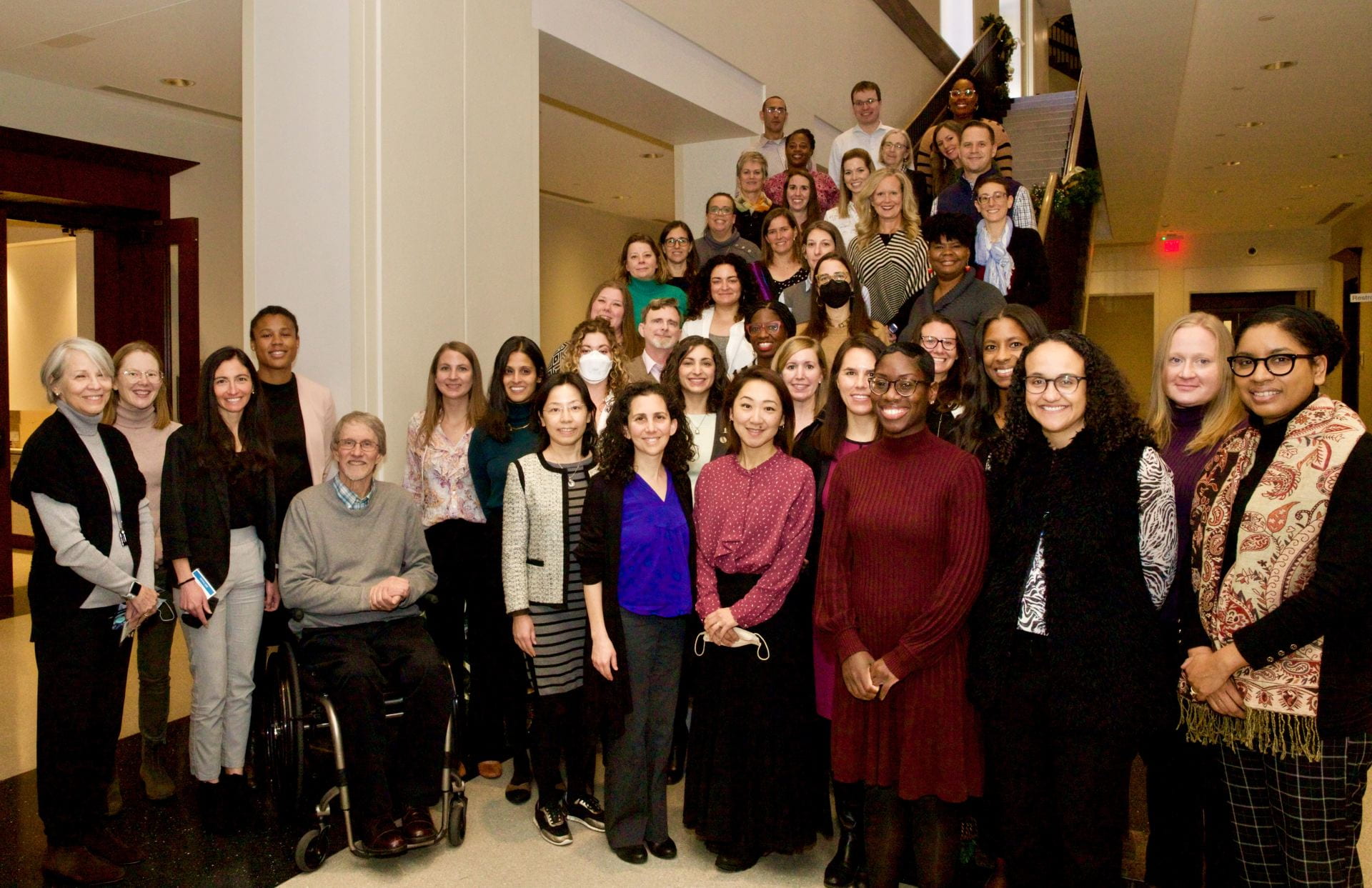
The IS-2 program offers training in dissemination and implementation (D&I) science – methods and strategies to advance evidence-based ways to reduce the burden of chronic disease and address health inequities. Three cohorts of 59 early- and mid-career scholars have been participating in the mentored training. The sessions began in 2020, but were conducted virtually due to COVID-19. Some scholars participated virtually in the November session, but all who attended agreed the in-person setting provided extra benefits.
“Zoom meetings can work if you’re just trying to get a technical skill across to someone, but the in-person experience provides an ability to build relationships, enjoy a meal together, laugh together,” said Ross Brownson, the Steven H. and Susan U. Lipstein Distinguished Professor at the Brown School and director of the Prevention Research Center. “We’ve underestimated the importance of that human connection.” Brownson co-leads IS-2 with Debra Haire-Joshu, who holds the Joyce and Chauncy Buchheit Professorship in Public Health.
“I think this was really important to get people together,” said Haire-Joshu, who directs the Center for Diabetes Translation Research at Washington University.
“Our scholars were so excited, so engaged. In-person, you put names and faces together in a different way and make connections that lead to more conversations, more idea generation, and more trust.”
Debra Haire-Joshu, PhD (IS-2 Program Co-Director)
The program aims to train the next generation of researchers in the field of D&I science, whose goal is to shorten the gap between research discoveries and their use in community and clinical settings. The training sessions are a cornerstone of the program and involve a combination of group consultations and lectures focused on key D&I concepts, such as adapting interventions for different populations and developing interventions for dissemination and sustainability.
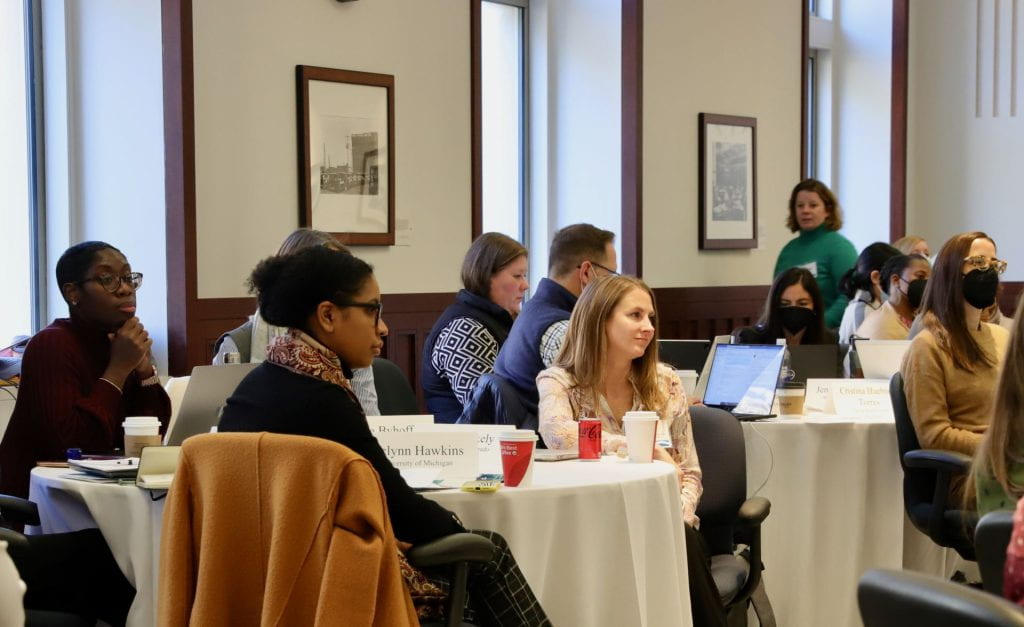
IS-2 works with key partners, including the National Institutes of Health and the Veterans Administration, to support the network of scholars and advance D&I training. The program includes 20 D&I experts, like Brownson and Haire-Joshu, as core faculty and mentors. For Haire-Joshu, mentoring is one of her favorite components of the IS-2 program. “The mentees are all about getting their research up and going. For me, it’s a great way to make sure these really sharp people are able to advance their careers and advance science.”
Shelly Johnston, the coordinator of the training sessions, said the program’s contact with trainees doesn’t end when the training is over. “We try to keep them involved in the network,” she said. In addition to the sessions, scholars have the opportunity to participate in webinars, collaborative workgroups, and mock grant reviews to extend their learning and connections within the program. The last session will be held later this year and will include members of the cohorts from 2021 and 2022.
Participants in the November session were positive about their experiences and the benefits of the training regimen.
“A rich learning environment”
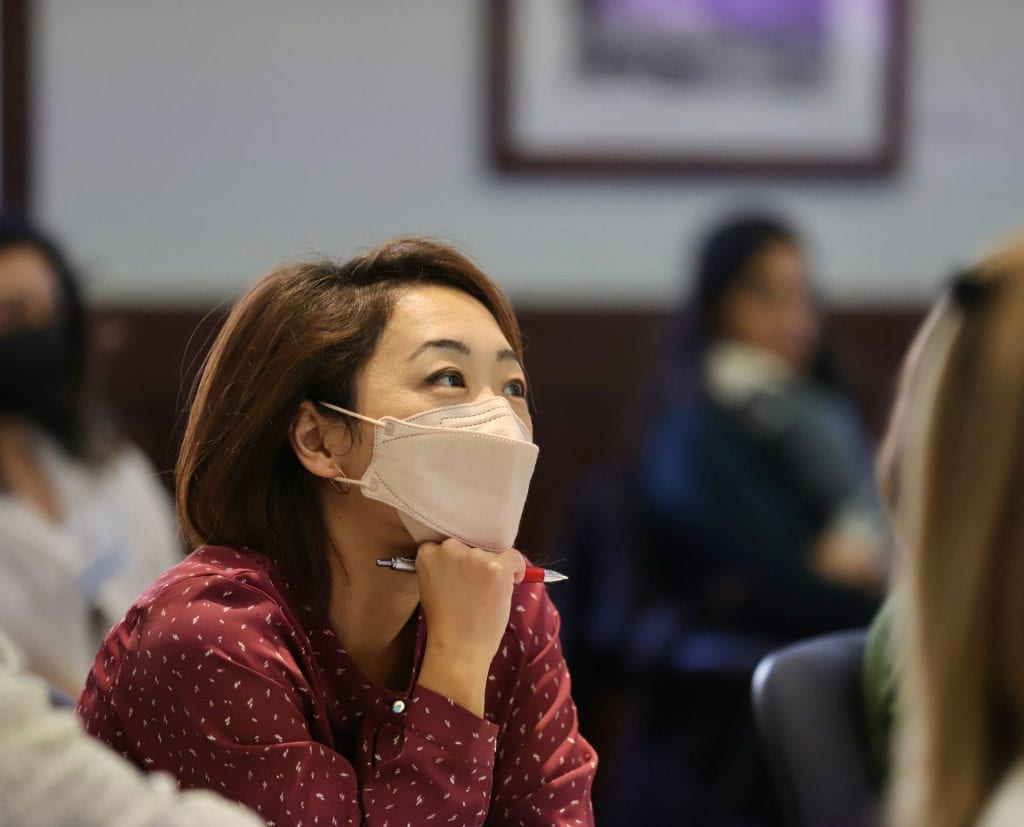
“I cannot say enough positive things about this high-quality training,” said Yuka Asada, clinical assistant professor of community health sciences at the University of Illinois-Chicago School of Public Health. “The combination of workshops, small group feedback sessions, and one-on-one mentoring is incredibly effective and makes it so helpful for an early-stage investigator like myself.” Asada, a registered dietitian, is working on a pilot study to improve access to federal nutrition support programs, like the Child and Adult Care Food Program. A 2021 scholar, she said her training mentor, Rachel Tabak, research associate professor at the Brown School, and other faculty, provided invaluable advice on developing grant proposals, focusing the scope of his project, as well as suggesting other experts with whom to consult. “Rachel is a human rolodex of references and always has several suggestions for relevant literature,” she said.
“It has been such a rich learning environment,” Asada said of the training, noting that peer-to-peer feedback and networking was also highly valuable. She said her experience in IS-2 also helped her develop and deliver the first doctoral-level course in implementation science in the DrPH program of the School of Public Health at UIC.
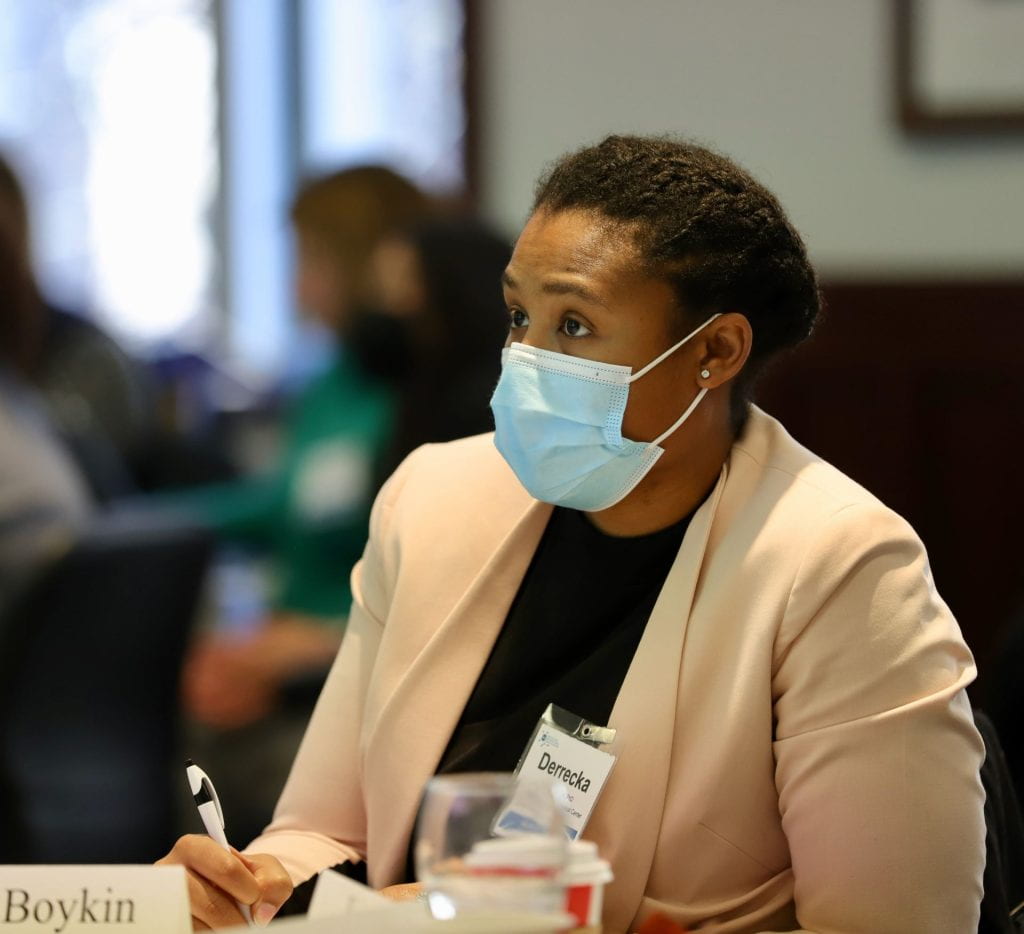
Derrecka Boykin, a 2022 scholar, is an assistant professor at the Menninger Department of Psychiatry and Behavioral Science in the Baylor College of Medicine. She is working on a project to develop a group therapy to meet the needs of women veterans who experience chronic pelvic pain – a difficult condition to treat due to the lack of gender-specific services in the VA. “I want to help people open up to how they can live their lives while living with pain,” she said. Boykin said the implementation science training helped her to consider ways to put the therapy she’s developing into practice through existing VA women’s health and pain programs, while considering patient perspectives, and adapting interventions for both urban and rural settings.
“I love this program,” she said, especially the advice from faculty experts and her mentor, Leopoldo Cabassa, a professor who directs the PhD program at the Brown School. “He’s a wealth of information and knowledge and like everyone is so approachable,” she said. “I’ve been trained to do clinical research, and I’ve come to implementation science really late. This training can help me get people what they need. You’ve got to find what works for you, and this has given me a plan for how I can apply all the things I’m learning to my own work.”
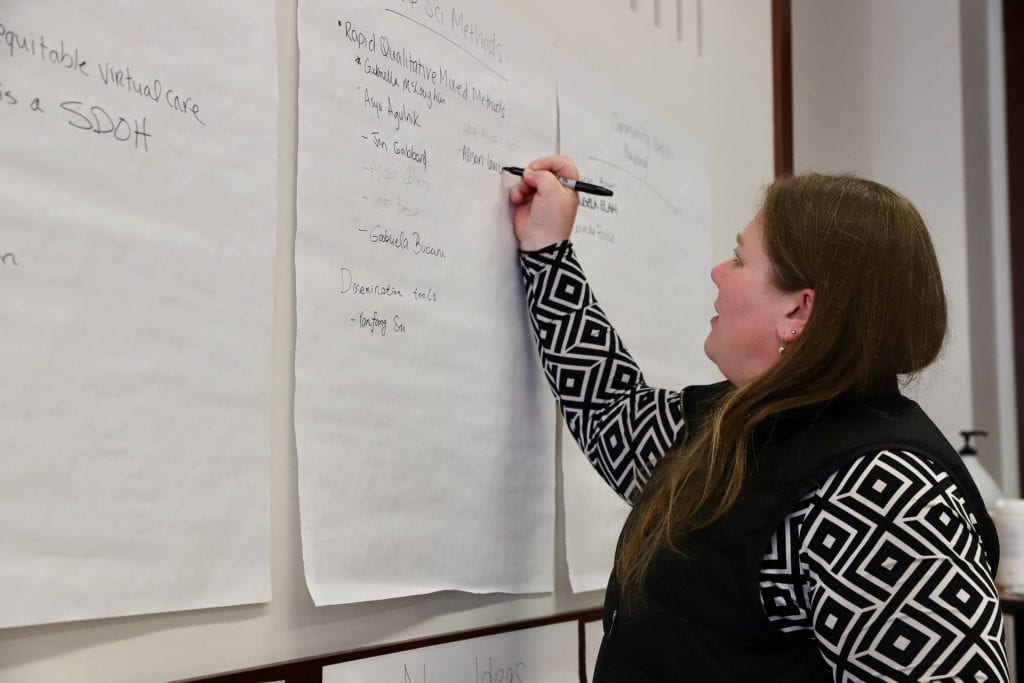
Using implementation science to enrich her research was also an aim of Allison Lewinski, a 2021 scholar who is an assistant research professor at the Duke University School of Nursing, and an investigator for the Durham Veterans Affairs Health Care System in Durham, NC. “Networking with mentors is great,” she said, noting in particular her mentor, Alison Hamilton, a professor at UCLA and Chief Officer of Implementation and Policy at the VA Center for the Study of Healthcare Innovation, Implementation & Policy at the Greater Los Angeles Healthcare System. Lewinski said Hamilton’s expertise on veterans’ issues and implementation science was especially useful for Lewinski’s work researching ways to relieve distress in veterans with diabetes. “Just being able to bounce ideas off her has been a great experience,” she said. “I don’t want my intervention to just sit on a shelf. I want it to be useful to clinicians and veterans in the real world.”
She also found the interaction with other scholars to be valuable. “A critical aspect of why IS-2 has been an important piece in my journey as an early career researcher is because the program created a community who shared a similar interest in using D&I to improve health outcomes,” she said.
“The IS-2 activities – the virtual and in-person institutes, work groups, and opportunities to connect–helped me foster substantive connections with my scientific community. I’ve been able to ‘nerd out’ with like-minded people.”
Allison Lewinski, PhD, MPH, RN (2021 Scholar)
The training also helped her focus on making sure interventions are equitable and to design projects from the ground up. “I’ve learned there are frameworks that can help guide grants from inception to completion,” she said. “You don’t just wing it, you have a map to guide you.”
Brownson noted that the IS-2 trainings will complement the Brown School’s new PhD in implementation science, which will be for both public health and social work students. He said the sessions showed the value of implementation science to post-doctoral researchers, as evidenced by the scholars’ appetite for the training. “The one thing I was really impressed with was the energy and the innovation of the scholars,” he said. “They’re already conducting research at a high level, and IS-2 can help take them to an even higher level.”
The Institute for Implementation Science Scholars (IS-2) is supported by funding from the National Institutes of Health (NIH) Office of Behavioral and Social Sciences Research (OBSSR) and Office of Disease Prevention, administered by the National Institute of Diabetes and Digestive and Kidney Disorders (R25DK123008, R25DK123008-S1) and the U.S. Veterans Administration.